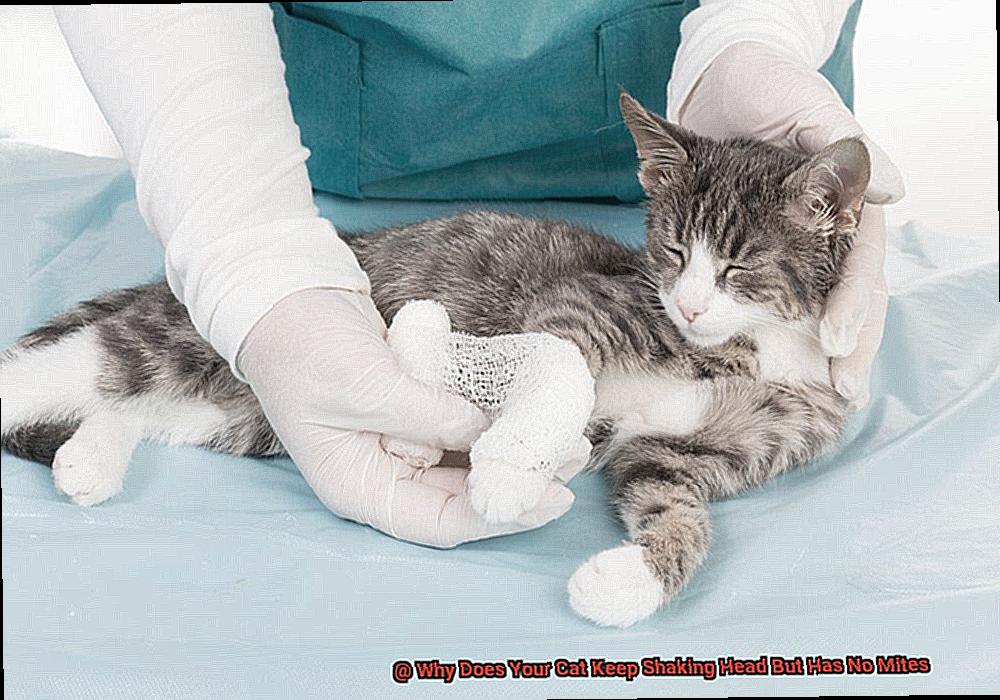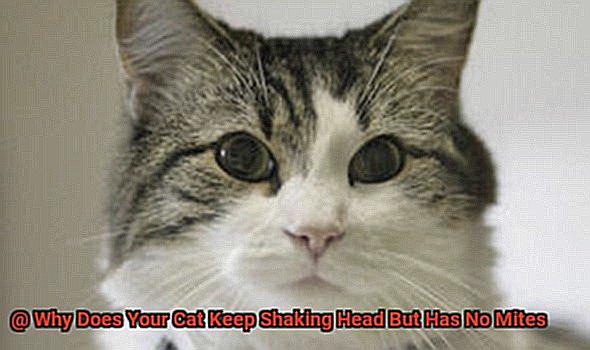As a devoted cat parent, you’re always on the lookout for any unusual behavior in your feline friend. So, when you notice that your kitty keeps shaking their head but there are no visible mites, it’s natural to feel concerned. But fear not. This peculiar behavior could have several reasons other than mites.
In this informative blog post, we’ll explore why your cat might be shaking their head without any mites present. We’ll cover a range of possible causes such as ear infections, allergies, foreign objects in the ears, and even behavioral issues. Our aim is to provide you with all the information needed to identify the root cause of the problem and help your furry companion.
Whether your furball has been persistently shaking their head or it’s a new behavior, we’ve got you covered with practical tips on how to ensure your cat’s health and well-being. So buckle up and get ready to discover why your beloved pet keeps shaking their head.
Common Causes of Cat Head Shaking Without Mites
While ear mites are a common culprit, there are several other reasons why your cat may be shaking its head that do not involve these pesky parasites. Let’s explore some of the most common causes of cat head shaking without mites.
Ear Infections in Cats
They may be suffering from an ear infection, a common problem among cats. Ear infections can be caused by bacteria, yeast, or allergies, with some cats being more prone to this issue than others due to their floppy ears or excessive hair in the ear canal.
But how can you tell if your cat has an ear infection? Watch for these symptoms: head shaking, scratching at the ears, redness and swelling of the ear canal, and a foul odor emanating from the ears. In some cases, there may also be discharge or bleeding from the ears. If you suspect an ear infection, take your cat to the vet right away.
The vet will examine your cat’s ears and may take a sample of discharge for testing. Treatment typically involves cleaning the ears and administering medication such as antibiotics or antifungal drugs. It is crucial to address an ear infection promptly because if left untreated, it can lead to more serious complications such as a ruptured eardrum or hearing loss.
Chronic ear infections can also be a sign of an underlying health issue such as allergies or immune system problems. So it is important to work with your vet to identify and address any underlying causes.
Injuries as a Cause of Cat Head Shaking
While ear infections and mites are among the common culprits, injuries can also be a potential cause. Injuries to the head or ear can trigger inflammation that results in head shaking, alongside other symptoms like disorientation, loss of balance, and lethargy.
If you suspect that your cat has sustained an injury, taking them to see a veterinarian immediately is crucial. The vet will conduct a thorough examination and may order additional tests like X-rays or a CT scan to identify any underlying conditions.
Treatment for injuries can range from medication to surgery or hospitalization, depending on the severity of the injury. Following your veterinarian’s instructions carefully and providing your cat with plenty of rest and care during their recovery is vital for their speedy healing.
Prevention is always better than cure when it comes to injuries in cats. Keeping their environment safe and hazard-free is essential.
If possible, keeping your cat indoors and supervising them when they are playing outside can help reduce the risk of injury. Promptly seeking veterinary care if you notice any signs of injury or illness can prevent further complications.
Allergies and Irritation in Cats
If you’ve ruled out the possibility of mites or infections, allergies and irritation may be the culprits. In this section, we will dive into the causes and treatment options for allergies and irritation in cats.
It’s not uncommon for cats to develop allergies to various things such as food, pollen, dust, or even certain materials. When a cat is allergic to something, their immune system releases histamines that can cause itching and inflammation. This can lead to frequent head shaking as your cat tries to find relief.
Ear infections are another common cause of head shaking in cats. Bacteria or yeast buildup in the ear canal can cause discomfort and irritation, leading to head shaking. In some cases, you may notice discharge or a foul odor accompanying the shaking.
If you suspect that your cat may be suffering from allergies or an ear infection, it’s crucial to seek veterinary attention promptly. Your vet can provide a proper diagnosis and treatment plan tailored to your cat’s specific needs. They may prescribe medication or recommend a change in diet or environment to alleviate your cat’s symptoms.
In cases of allergies, your vet may suggest antihistamines or corticosteroids to reduce inflammation and itching. If the allergy is food-related, they may recommend switching to hypoallergenic food for your cat.
For ear infections, antibiotics or antifungal medication may be necessary along with ear cleaning. It’s crucial to follow your vet’s instructions carefully to ensure your cat makes a full recovery.
Diagnosing the Underlying Cause of Cat Head Shaking
So, when you notice your kitty shaking their head more often than usual, it’s essential to take action promptly. In this article, we will explore how to diagnose the underlying cause of cat head shaking and what steps you can take to help your furry companion.
Diagnosing the underlying cause of cat head shaking can be challenging since there are several potential reasons for this behavior. Ear infections, allergies, foreign objects in the ear canal, and neurological disorders are some possible causes. However, a visit to the vet can help identify the root cause and pave the way for effective treatment.
Your vet will begin by examining your cat’s ears to check for any signs of infection or inflammation. They may also perform a comprehensive physical exam to look for other signs of illness or injury. In some cases, they may recommend additional diagnostic tests such as blood work, urinalysis or imaging studies to rule out more severe conditions such as tumors or other neurological disorders.
Once your vet has identified the underlying cause of your cat’s head shaking, they can develop an appropriate treatment plan. This may include medications to treat infections or allergies, ear cleaning and flushing, or even surgery in severe cases.

It’s crucial to work closely with your veterinarian and stay alert to any changes in your cat’s behavior. By doing so, you can help ensure that they receive the prompt and effective treatment they need for any underlying health issues.
In conclusion, diagnosing the underlying cause of cat head shaking requires a careful and thorough approach. So if you notice your feline friend shaking their head frequently, don’t hesitate to seek veterinary attention promptly.
Treating Cat Head Shaking Without Mites
Although it can be a challenge to determine the cause of cat head shaking without mites, there are a few possibilities to consider. As an expert on treating cat head shaking without mites, I am here to provide you with insights on what could be causing this behavior in your kitty.
One potential cause of cat head shaking is allergies. Just like humans, cats can be allergic to a variety of things such as pollen, dust, and certain foods.

If your cat is shaking their head and scratching at their ears but has no mites, it could be due to an allergic reaction. Your vet may suggest allergy testing or a hypoallergenic diet to alleviate the symptoms.
Another possible cause of cat head shaking is ear infections. Even if you don’t see any visible signs of infection, your cat could still be experiencing discomfort and inflammation in their ear canal. Your veterinarian can conduct an ear exam and prescribe antibiotics or other medications as needed.
Sometimes, cat head shaking can also be a behavioral issue. If your feline is anxious or stressed, they may shake their head as a way to self-soothe. Identifying and addressing the underlying cause of your cat’s anxiety is essential in these cases. This might require changes to their environment or daily routine.
Home Remedies for Cat Head Shaking Without Mites
While ear mites are a common cause of this behavior, if you have ruled them out as the culprit, there are still several home remedies that can help.
- Firstly, regular ear cleaning can prevent infections and reduce head shaking. You can use a gentle ear-cleaning solution specifically designed for cats or make your own using equal parts of water and vinegar. Simply apply a few drops into your cat’s ear canal, massage the base of their ear for a minute or two, and then gently wipe away any excess solution and debris with a soft cloth or cotton ball.
- Secondly, providing your cat with a healthy diet can work wonders in boosting their immune system and preventing infections. Feeding them a diet that is high in protein and low in carbohydrates, along with adding supplements such as omega-3 fatty acids and probiotics, can help improve their skin and coat health, ultimately reducing head shaking.
- Lastly, stress is also a common contributor to head shaking in cats. Creating a peaceful environment by giving your cat a cozy bed or hiding spot, playing soothing music, or using pheromone sprays/diffusers that mimic the scent of mother cats can significantly reduce stress levels.
It is important to keep in mind that if your cat’s symptoms persist or worsen, it is crucial to consult with a veterinarian to rule out any underlying medical conditions.
Prevention Tips for Cat Head Shaking Without Mites
One common issue that cats face is head shaking, which can be caused by various factors other than mites. To prevent head shaking without mites, there are several prevention tips you can follow.
Clean Ears, Happy Cat
Cats are known for their cleanliness, but it’s essential to keep their ears clean too. Regularly cleaning your cat’s ears can help prevent any build-up of dirt, wax, or debris that could cause irritation and inflammation in the ear canal. Use a damp cloth or ear cleaning solution recommended by your veterinarian to gently wipe away any build-up.

Balanced Diet, Healthy Cat
Feeding your cat a well-balanced diet is crucial for preventing head shaking without mites. A high-quality cat food rich in protein, vitamins, and minerals can help boost their immune system and keep them free from infections and other health problems. Treats should be given in moderation as they can unbalance the diet and cause health issues.
Clean Environment, Happy Cat

Your cat’s environment plays a significant role in their overall health and wellbeing. Regularly cleaning your home can help reduce the number of allergens that trigger ear infections and other health problems that may lead to head shaking. Vacuuming, dusting, and washing bedding can help reduce allergens while keeping your cat’s living space clean and comfortable.
Regular Vet Visits, Healthy Cat
Regular check-ups with your veterinarian are essential for preventing head shaking in cats. Your vet can examine your cat’s ears for signs of infection or inflammation, providing treatment if necessary. They can also recommend preventative measures specific to your cat’s individual needs based on age, breed, health status, and other factors.
Pay Attention to Your Cat’s Behavior
Cats are known for their peculiar behavior, but it’s essential to observe your cat’s behavior and look for any unusual symptoms such as fever, loss of appetite, or excessive scratching at the ears.
These could be indicators of a more severe underlying health issue that needs prompt medical attention. By being aware of your cat’s behavior, you can prevent head shaking without mites before it becomes a more significant issue.
WwZ1rStsiPs” >
Conclusion
In conclusion, if you notice your feline friend shaking their head persistently but can’t spot any mites, don’t panic. There are various reasons why cats exhibit this behavior, and it’s crucial to keep an eye on them and seek veterinary attention if you notice anything out of the ordinary. Ear infections, allergies, foreign objects in the ear canal, and even behavioral issues can all contribute to head shaking in cats.
To prevent head shaking without mites, maintaining a clean environment free from allergens that may trigger ear infections is essential. Regular ear cleaning and a well-balanced diet can also help boost your furry friend’s immune system and reduce the likelihood of infections. Moreover, keeping a close watch on your cat’s behavior and scheduling regular vet visits can help identify any underlying health issues early on.
It’s always better to be proactive when it comes to your cat’s health and wellbeing. By taking preventative measures such as ensuring proper hygiene and seeking prompt veterinary care when necessary, you can ensure that your furry friend stays healthy and happy for years to come.

